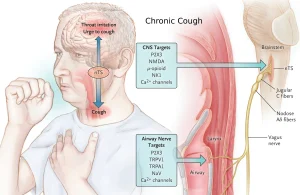Overview
Diagnosis
Your healthcare professional will begin by reviewing your medical history and performing a physical exam. A detailed history and examination can provide important clues about the cause of a chronic cough.
Often, treatment for one of the most common causes is started before ordering expensive tests. If symptoms do not improve, further testing may be needed to check for less common causes.
Imaging Tests
X-rays
A routine chest X-ray may not reveal common causes of chronic cough, such as postnasal drip, acid reflux, tobacco use, or asthma. However, it can help detect other conditions like lung cancer, pneumonia, or other lung diseases. An X-ray of the sinuses can show signs of a sinus infection.
CT Scan
A CT scan, also known as computerized tomography, can provide detailed images of the lungs and sinuses. It helps identify lung diseases or infections that may cause chronic cough.
Lung Function Tests
Lung function tests, such as spirometry, are simple and noninvasive procedures used to check for asthma or chronic obstructive pulmonary disease (COPD). These tests measure how much air the lungs can hold and how quickly air can be exhaled.
An asthma challenge test may also be performed. This involves measuring breathing before and after inhaling a medication called methacholine (Provocholine) to assess airway sensitivity.
Lab Tests
If the mucus you cough up has color, your healthcare professional may test a sample for bacteria or infection.
Scope Tests
If the cause of a chronic cough remains unclear, specialized scope tests may be recommended:
-
Bronchoscopy – A thin, flexible tube with a light and camera is used to examine the lungs and airways. A small tissue sample, or biopsy, may be taken to check for abnormalities.
-
Rhinoscopy – A fiberoptic scope, known as a rhinoscope, allows examination of the nasal passages, sinuses, and upper airway.
Children
In children, a chest X-ray and spirometry are typically ordered first to identify possible causes of chronic cough.
Treatment
Identifying the underlying cause of a chronic cough is key to effective treatment. In some cases, more than one condition may be contributing to the symptoms.
If you smoke, your healthcare professional may discuss smoking cessation options. If your cough is caused by a medication such as an ACE inhibitor, a different prescription may be recommended.
Common medicines used to treat chronic cough include:
-
Antihistamines, corticosteroids, and decongestants – Used for allergies and postnasal drip.
-
Inhaled asthma medicines – Corticosteroids and bronchodilators help reduce inflammation and open airways in asthma-related cough.
-
Antibiotics – Prescribed if bacterial, fungal, or mycobacterial infection is found.
-
Acid blockers – Used when chronic cough is caused by acid reflux and lifestyle changes are not enough.
Medicine to Reduce Coughing
While identifying the cause, a healthcare professional may prescribe a cough suppressant to temporarily reduce coughing. These medicines are not recommended for children.
Over-the-counter cough and cold medicines may relieve symptoms but do not treat the underlying cause. Studies show these medicines are often no more effective than no treatment at all. They can also pose serious risks to children, including dangerous overdoses.
Avoid using non-prescription cough or cold medications for children under 6 years old, and consult a healthcare professional before giving them to children under 12 years old.
Advertisement

